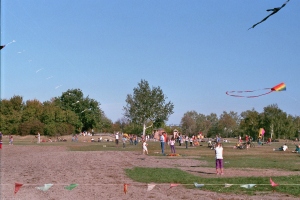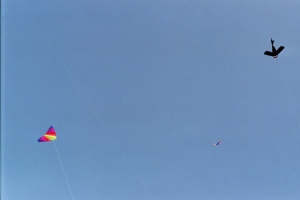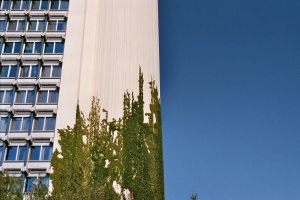Two weeks of German
10 days later it was time to leave the mountains. My bag was full of delicious jam, pickles and bread that I had helped make. I left on Sunday night, with a lift through carpooling.co.uk. A man called Viktor was driving from Villach to Bratislava, and I managed to get a lift to Vienna for only 10 Euros! (the train was 50 Euros). I was feeling pretty tired, as I had had a late night and a few drinks the night before. I was looking forward to listening to my music, staring out the window and perhaps having a little nap. Not if Viktor had anything to do about it. Viktor was a very inquisitive man, he could speak 7 languages and was thirsty for knowledge. He made it his mission to get out all the information I had on Australia. This involved 1000’s of questions ranging from what were some famous Australian icons/celebrities/brands/foods; the metric system; the Australian dollar; house prices; Australians’ average annual income; the distance between capital cities; the population and demographics; the weather… and the list continues. I had to make up a few things, but I’m sure he checked everything I said when he got home anyway. He had little interest for the 3 other Austrian passengers sitting squashed up in the back of the car. I guess there was probably nothing about Austria that he didn’t already know.
A small kite festival I stumbled upon on a Sunday walk
I got back to my miniature flat in the student residence where I was staying. The hospital-like interior and grey atmosphere didn’t bother me at all, I was just happy to be away from the endless Australia-related questions. However the contrast between the mountains and city was felt straight away, and I immediately missed the fresh air and happy little routine that I had had. The next day I started my 2 week intensive German class. I found out why it was called intensive. 4 hours of German a day, for 10 days. Intense.
A lot of the other students in the class where European, and had experience at learning other languages, at least by learning English and in some cases other languages too. It makes me angry that Australian schooling is so lax at teaching foreign languages. There is a certain arrogance at thinking that because English is a dominant language that no others are useful. I understand that because Australia is so far away from everywhere it is difficult for students to practice the languages that they are learning, but I still think that it is a skill that every brain should have to concur. And they say that it’s much easier for children to pick up new languages. I struggled initially in the German class, and felt that I was behind the students in picking up the language. I don’t know if it was because I didn’t have any experience at learning a language, or that I had other things on my mind at the time, or simply if languages were not my strong point. However, it did get a little easier. The class became a lot more enjoyable as everyone got to know each other. We even went out for drinks a few times, and would chat in the breaks about our troubles and successes in our new homes.
We learnt a lot in the two weeks. Everyday I could understand more and more German words written on advertisements; in the metro; on street signs; or spoken in the street. It was really useful learning the numbers, as I began to know how much my shopping cost at the vegetable market; which meant that I didn’t have to guess or always hand over way too money just to be on the safe side.
Me at the fruit and veggie market outside the metro station near my house. Much cheaper and fresher and friendlier than the supermarket.
During my first two weeks in Vienna I wasn’t so happy. After my busy and fun time in the mountains the realisation that I was all alone in a big foreign city hit me. I have traveled a lot in the past, but always with friends. This makes the difficulties that you come across not such big dilemmas, as they are shared with others and solved together. Now I was the one solely in charge of the map (not my strong point) and getting lost was a frequent occurrence. I was really missing my friends, family and lover back home, and was wondering why I had chosen to come and live on the other side of the world from them. Small things, like washing my clothes or getting my film developed, became difficult tasks. I knew it would get easier as it all became more familiar, but I still felt lost and frustrated a lot of the time.
-Betty
Home again
I leave within the month to return to Australia. I have this acceptance that I have to leave. I want to go home, but I wouldn’t mind if I stayed here for another 6 months.
It’s strange for me to explain how I feel. It’s not like homesickness where I would cry and feel sorry for being in such a stupid town in stupid old Germany full of stupid people with stupid ancient buildings.
Now I just feel like, I know what it’s like to live in Bavaria. (I say Bavaria because it is the richest state in Germany) and I think I’d be happier in Australia.
Although, “happier” might mean angrier too. Here I’ve been completely devoid of notions of politics and stupid politicians. Recently I’ve been catching up on Australia and my god, is there a lot of things I’ll have to get involved in when I get home. Not the least getting a big sticker that says, “Failure O’Farrell”
But I also like the way I’ve seen how different things are here and how they should maybe be implemented back home. I have this feeling that from seeing how other people do things I can make my country better.
I don’t know, it is this strange sort of patriotism. I think that Australia is one of the best countries in the world, and I’ve seen some examples on how to make it better.
I’m afraid of that “I’m not from here anymore” response to returning. I don’t want it to be like that. I want to be able to just go back to the familiar.
Don’t get me wrong. Things aren’t strange and unfamiliar here, not anymore. It’s just that I feel I’d be happier with the stuff I’ve been familiar with for 20 years than what I’ve been familiar with for 6 months. I know,, it’s not really a fair time to compare, I also want to come back here later in life, but right now I feel like I could be accomplishing more back in Australia.
Who knows…
P.S. I also really miss sandwiches/salads/small lunches. Here a hot, cooked lunch is really common. Took me a while to notice that, but the “Mensa” or cafeteria has mostly only warm dishes, and everyone seems to think it is normal… I also miss our type of bread. I can live with bread here, but it’s mostly a choice of sourdough or really crappy “America bread” which is stale, preservative ridden, horrible tasting bread that looks like what you can get in Australia. I also am a bit of a food snob, so I can’t wait to walk into Woolies and have such selection of brands I know and fruit and veg from the next state not South America (not that it’s a problem, I just like buying Aussie grown) and I won’t miss the ability to know where all my food comes from (here nothing is labelled unless it’s something from Aldi that they sell in Aus). Probably only 3 foodstuffs I will miss from here are Kaiserbrotchen, Spatzle and Chocolate. Beer and it’s quality and diversity and cheapness is also a problematic farewell.
‘Cool story, hansel’
– Olaf, Zoolander

The train trip from Prague to Berlin was nowhere near as long as Norwich to Prague, but it was both uncomfortable and turbulent. The good weather from Prague was continuing and the train had little or no air-conditioning, so it was BOILING (33 degrees is now intolerable for our acclimatised thermoreceptors) and it seemed, despite our best efforts, that we couldn’t help sitting in seats that had been reserved, so people kept boarding and telling us we had to move. We later discovered it may’ve been some kind of German holiday, which could explain the remarkable density of passengers on the train. But it was so irritating that there was no way of telling which seats were reserved and which weren’t, because both times we had to move we’d picked seats that didn’t say they were reserved. I thought the Germans were supposed to be efficient! Must’ve been the Czechs’ doing …
After a couple of relocations, the conductor told us to go to first class, where we were allowed to remain undisturbed until we reached our destination, and where the passengers provided some amusement. In our first couple of hours in Germany we witnessed no less than three heated exchanges, the first one being on the train.

‘They’re breakdance fighting!’
An older couple were sitting across the aisle from one another in what were ostensibly available seats when a younger woman, probably in her early thirties, boarded and informed the gentleman that she had reserved his seat. Instead of leaping up apologetically as we had done, the gentleman asked her something in German. I couldn’t believe the exchange that ensued. In my world it would’ve been, ‘Oh, excuse me, sorry, but I think you’re in my seat.’
‘Oh, am I? Are you sure?’
‘Yeah, I think so. I’m pretty sure it says on my ticket. Hold on, I’ll just check … Yep, it does.’
‘Oh, so sorry! One second.’
‘No, don’t worry about it!’
But instead, after he asked if she was sure, she got all pissed off and rifled through her bag with exaggerated motions, unfolding a piece of paper and reading it out triumphantly like a petty child saying, ‘Mum said you have to give me a turn.’
The gentleman conceded and she sat down. Soon she was asleep without a care for the man probably thirty years her senior who had to stand for the remainder of the journey. Of course if you’ve paid for and reserved a seat in first class you’re entitled to use it; it was just the way she did it.
There was also an old Australian guy talking really loudly to someone about the percentage of Australian land classified as semi-arid. We never saw or heard his interlocutor say a word, which made us wonder if the Australian was just overenthusiastically chewing the ear off some poor mild-mannered European too polite to stop the one-sided conversation.
Our hostel, the Amstel House, was adequate – nothing terrible, but nothing spectacular. It was overrun for the duration of our stay with sixteen-year-olds who we speculated must’ve been on a school trip. Talking to one of them in the elevator, or ‘Schindler’s Lift’ as we called it, we learned that he and his class were Year Ten students, reportedly the senior year of German high school, on a final, celebratory school trip.

It was so strange to see them drinking and smoking, which is legal at their age in Germany. They looked like children, little boys with hands too small for the oversized Berliner Pilsener bottles they were drinking from. Of course Australian sixteen-year-olds drink and smoke, but you don’t see them doing it so conspicuously, and certainly not while talking to their teachers. Even eighteen-year-olds weren’t allowed to drink on our Year Twelve trips and functions.
When we first arrived the only other person in the room was this guy napping in his underwear. Or at least we thought it was just a nap. Every time after that we came into the room he was sleeping. We got up at ten one morning and when we came back that night he was STILL in bed. Human koala or what.
Customarily we took a New Europe free walking tour on our first day in Berlin. Apparently they had unusually large numbers that day and we had to wait around for ages while they found another guide.

Amusing ourselves while we waited.

Kept spotting these contraptions around everywhere.
Looking over the potential guides like cattle, Til somewhat superficially expressed a desire not to end up with the ‘albino loser.’ To be fair, he did look like a bit of a loser, even though that sounds really harsh. It was in the mid-thirties and we’d all been standing in the sun too long, but he was bright red and sweating profusely. Of course, we did end up being assigned to him, and he ended up being very cool and hilarious. So despite all the fascinating things about Berlin’s history we learned on the tour, you could say the most valuable lesson of all was that sometimes, people who look uncool are actually just Irish.
And just to ram the lesson home, he was actually probably the best guide we’ve had so far. The guys who maybe were a bit more traditionally ‘cool’ in Amsterdam and London sometimes seemed like they were only being friendly because they had to, but this Berlin guide was really genuine.
The city itself kind of echoes the adage about books and covers in that it is not a beautiful city, but it is SO INTERESTING AND COOL. ‘Poor but sexy,’,as the city’s mayor is supposed to have said, unintentionally coining its unofficial motto (the other great quote of his we heard was his statement just before an election: ‘Yeah I’m gay, who gives a fuck?’). The city is supposed to be in a massive amount of debt, hence its relative ugliness, but this I think is also what has made it ‘Europe’s coolest city’ – the shabby-chic quality.

‘I give you … DERELICTE’
And what other city in the world has been literally bisected for any amount of time, let alone nearly thirty years? In one century it was the capital of a nation that instigated two world wars. It saw a federal monarchy, a totalitarian dictatorship, a socialist republic, and two separate federal parliamentary republics, and swung radically between the poles of the political spectrum. That’s the kind of turmoil that isn’t recovered from quickly or easily, but it’s also the kind that, once over, yields great works of art as its people try to work through the emotional damage.
Some of the most interesting things we saw on the tour were the unique and controversial Memorial to the Murdered Jews of Europe; the deceptively unremarkable carpark occupying the space above the bunker where Hitler committed suicide; the remnants of the Berlin wall, which was, somewhat ironically, fenced-off; the uninspiring Checkpoint Charlie and, perhaps most importantly of all, the balcony over the edge of which Michael Jackson infamously dangled his baby.
 Our guide telling us about the memorial.
Our guide telling us about the memorial.
 The Hitler carpark.
The Hitler carpark.


The cheesy ‘last American soldier’ sign looking into East Berlin.

The notorious balcony.
 Berlin’s second rate rip-off of ‘Iamsterdam’: ‘be Berlinternational.’ Next it’ll be ‘London’t ever leave’ and ‘Belgood Belgrade’ or something.
Berlin’s second rate rip-off of ‘Iamsterdam’: ‘be Berlinternational.’ Next it’ll be ‘London’t ever leave’ and ‘Belgood Belgrade’ or something.
 Building extension by the same guy who did the Louvre’s glass pyramid.
Building extension by the same guy who did the Louvre’s glass pyramid.

Some cool statues.
After the tour we went for drinks with the guide and some others from the tour, which was fun. Some of us went on to have dinner as well, at this cool little noodle house where I was able to find a dinner without any vegetables, thus avoiding E coli and consequent death. Subway next door had stopped serving tomatoes, lettuce and cucumber altogether.
Once we were done we were faced with the task of working out how the hell to get back to our hostel from where we’d ended up. To further complicate matters, I hadn’t brought the DSLR case with me, the better to quickly take the amazing shots you see displayed throughout this blog, and it began POURING in such a way as we haven’t seen since we left Australia – they only get pissy rain in England. We got soaked, but with characteristic quick wits, I resourcefully acquired a Subway bag in which to store the baby.
Huh … Two faux-arrogant jokes in one paragraph, there … Good one.
 Drowned rat.
Drowned rat.
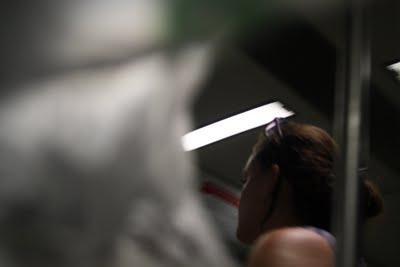
Totally artistic picture of Til from inside the Subway bag.
On our second day we planned to visit Sachsenhausen, the site of a former Nazi concentration camp and then a NKVD special camp but we had no idea how to get there. Not eager to repeat the Versailles incident, we realised we needed to access the internet to get directions.

The directions are IN the computer!?
However, exhibiting a travelling trait we’ve only recently discovered in ourselves, hostel patron’s reluctance (HPR), we spent the entire morning looking for an internet cafe rather than just going back to the hostel where we knew there was free wireless. Whether HPR arises from a deep-seeded subconscious loathing for the poor-to-average accommodation the sufferer occupies, or sheer illogical laziness, we don’t know. We do know that it affects millions of people every year, and you can make a difference …
Travelling has made me mourn the decline, so soon after its swift rise to prominence, of the internet cafe. I’m sure everyone who opened one of these grimy little nerdhavens thought they’d grow rich and corpulent out of the enterprise, so forward thinking was it. It combined the ancient appeal of the cafe with the futuristic concept of the internet – the cafe of tomorrow! But they didn’t foresee the meddlesome intervention of wireless, with the additional blow of the smartphone, which rendered them so obsolete. Travel, however, has proven that they aren’t obsolete, through the innumerable times I’ve needed to search all over a city to find one in which to access and print off an online boarding pass or some such. I really think that, if not provided by the private sector, local governments should ensure points of public internet access are available. Our society is so dependent on the internet and all our gadgetry that public, possibly local-government funded kiosks providing internet access terminals and recharge stations for phones and stuff shouldn’t be an outlandish idea.
It literally took us hours to find an internet cafe, with many mirages along the way. People gave us directions to cafes with wireless, mistaking our meaning, and one sign must’ve been referring to one of the (lamentably) many closed-down internet cafes.

Finally though, we got our directions to the camp and made our way there, in spite of the directions’ cutting off once you reach the right train station and very helpfully telling you to ‘follow the tourists.’
As is to be expected, it was disturbing, depressing, and fascinating. It was sobering to realise, as I roamed around the site, how physically exhausting and uncomfortable it is simply to live, let alone to live as a prisoner under the Nazis or GDR. I was constantly thirsty, hot, and tired; all I wanted to do was sit, and that discomfort was only a millionth of everything the former inhabitants of the camp had to go through. What was also interesting was contemplating and observing how Germany has dealt with its history in the forms of these camps and memorials. Usually when historical sites are advertised elsewhere, it’s with invitations to fascinating historical insight, or appeal to patriotism, or even with a degree of insouciance permitted because of the historico-temporal distance of the event, as with a medieval torture museum or something, but for obvious reasons none of these options are available for German history of the twentieth century. The Sachsenhausen website, accordingly, is threadbare. It simply calls the memorial ‘an uncomfortable reminder of the past.’
‘Work sets you free.’

Reconstruction of the death strip.
I remember when I found out one of my best friends Jenny was of German descent in Year Four, I was like, internally, ‘But they were the bad guys … Awkward!’ I had to ask my parents if Germany was still bad now. But in my adolt (adolescent+adult) life I’ve always observed in Germans a profound, sincere graveness when it comes to their own recent history. When my sisters’ class had to write a speech on an influential historical figure/hero and someone wanted to be a smartass so they did Hitler, the class’s German exchange students reacted by asking how they could joke about something like that, which is unusually mature for an average sixteen-year-old. In Germany, we learned, it is illegal to do a Nazi salute, and a Canadian who did it outside the Reichstag as a joke for a photo a few months ago is still in jail for it.
All of this, I think, shows the world that Germany is serious about this issue. And it’s comforting that in a world where nothing’s sacred, something can be treated with such near-universal reverence by a nation. I’m glad it’s not like what I’ve heard the British history curriculum is like (from my friend Kim), awkwardly skipping over the fact that the British Empire screwed up the world wherever it went, or like in Australia where we learn about what we did to Aborigines (up until more recently than World War II, might I add, and to a lesser extent in continuation), but it’s not really treated with any reverence, perhaps because we learn SO MUCH about it that we’re kind of desensitised.
And that’s something that was interesting about the Jewish memorial saw on the tour. It wasn’t didactic. It actively discourages desensitisation through its subtlety – it doesn’t proclaim itself even to be a memorial. It is something to be happened upon and wondered over and investigated at leisure. Like all good art, it invites the viewer to wonder what it is saying and thereby think about the issue. It doesn’t smack you over the head with numbers that are so tragically large as to be incomprehensible. It also cleverly sidesteps the debates and issues surrounding the holocaust – namely who that term refers to, whether or not its victims deserve more attention and memorials than other victims, and (it’s sad that this is even debated, but) whether or not it actually happened. It simply cuts to the issue.



And yet, in another way, it is desensitising. It encourages you to just incorporate this blight in history into your everyday life, perhaps without even thinking about it. It looks almost like a gigantic playground, labyrinthine, the kind of place kids would want to run around and play hide ‘n’ seek in, the kind of place you would want to lie down in the sun with a book. ‘Oh, I’m just taking the kids down to the holocaust memorial for a picnic; I want to finish my book and the kids love it down there,’ you might say. It seems this was the artist’s intention, but the authorities have since imposed restrictions that contravene it. I’m not sure how I feel about it. It works as art, but does it work as a memorial if it encourages laughter and games and, indeed the removal of emotion from the equation? But then I think, there are plenty of normal memorials. Why not let this one be different as it was intended? Why let the artist go ahead with his design and then change your mind and make ‘no laughing’ rules?
After a day or two, we came to realise the suburb we were staying in was kinda crappy, and we wanted to see the famed trendy, artistic side of Berlin we’d heard so much about.
 The front window of a sports betting place in the suburb we stayed in. How homoerotic is it? I think it’s something to do with the fact that they’re all so close together whilst kneeling. And where the guy is holding the other guy in the front.
The front window of a sports betting place in the suburb we stayed in. How homoerotic is it? I think it’s something to do with the fact that they’re all so close together whilst kneeling. And where the guy is holding the other guy in the front.
We found out that the art culture of the city was concentrated in the area of Mitte, so we headed there. Of course the trendy, artistic part of town is always accompanied by hipsters, so when we weren’t sure whether we had reached Mitte or not, we started looking out for signs of hipsterism. First we saw a girl wearing a flanno, then a guy wearing a pair of thick-rimmed glasses. All of a sudden there were art installations in the street and we knew we were there. Funny how reliable the hipster indicator can be.


As a result of this, we drawled as we walked around, our own version of The Bedroom Philosopher’s ‘Northcote (So Hungover)’ featuring lyrics such as ‘Riding around on the U-Bahn. So hungover. Gonna go down to Friedrichstrasse, do some graffiti.’
In Mitte we visited Tacheles, a block of buildings where artists have been squatting since 1990, selling their work and constantly fending off eviction notices. It was pretty grungy but cool.




We had dinner down the road from Tacheles and watched the prostitutes stroll by. We weren’t ready to go home afterwards though, so we went looking for a cool bar to have a few drinks in. It came to us in the form of X-Terrain. It was an old coal cellar which the owner restored and renovated himself over four years, furnishing it with artwork he’d made himself. It had an amazing ambience, but was strangely empty. Probably just ’cause it was a weeknight or something.

As soon as I’d walked into the seating area, a Canadian woman in her fifties pounced and began a conversation with me. She was there with her husband and I got the impression they’d been sitting there in silence and she was desperate for a conversation. They were a really nice couple, though, and we probably ended up talking for about an hour.
The next day we’d arranged to meet Tilly’s UEA flatmate Carina, a Berliner, to hang out and go around town. It was cold and rainy, unfortunately, but we didn’t mind. After all,
 ‘moisture is the essence of wetness, and wetness is the essence of beauty …’
‘moisture is the essence of wetness, and wetness is the essence of beauty …’
First we visited the Berlin Wall Eastside Gallery, an open-air series of murals painted on the Berlin Wall, in the rain, then went through some cool courtyard shops, including the appelman one, the store devoted entirely to the distinctive East Berlin traffic light man. We also came across this guy making massive bubbles and regressed to our respective childhoods in wonder.




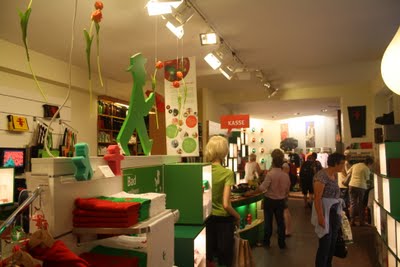
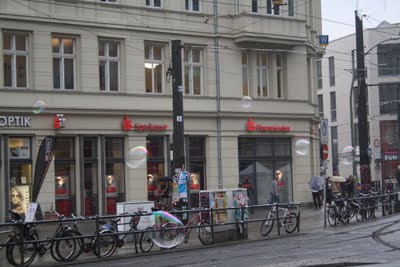


The next day we left Berlin by train for Amsterdam. We had a breakfast of fruit salad and yoghurt in cups on the train, which we’d bought from the station from a woman who assured us there were spoons in the bag. BUT THERE WEREN’T. I bet she’s some bitter old witch of a woman whose only comfort in life is telling people their spoons are in their bags when really they aren’t and going home to cackle to herself about the thought of their predicament when they are left yoghurtful and spoonless on the train. I know you’re out there, old crone, laughing at me.
 Laughing and lying and laughing!
Laughing and lying and laughing!
Eurovision host country 2011
Actually this isn’t about Eurovision – except my friend from the US has no idea what it is. Me and some British exchange students are going to educate her tomorrow night.
I have about two and a half months left in Germany and I thought I should list some differences. This will probably sound like a rant but really, nothing much bothers me about this country. If it does I’ll say.
There is a main topic that I’ve been following in Australia and that is about the R18 ratings for games. I like how Germany has done their’s here, a photo from Saturn, kinda like JB HiFi but bigger with fridges etc.
You can easily tell which games are for what age group. No little kids getting their mittens on the other games. Downside – in Germany they are really touchy about violence and such, so sometimes games are edited or not allowed to be displayed or advertised in the store. That is really stupid as some times the games are altered to not give a realistic example of what happens if you shoot someone.
Despite the price of the tickets, DB is worth it, especially if its group travel. They have many excellent deals. The Bayern ticket is quite awesome. With it you can take all local public transport in Bavaria, for up to five people. And weekend travellers can get a Schönes-Wochenende-Ticket for all local transport all over Germany for 5 people or for parents and their unlimited children under 14.
On all the major stations one can get one of these 50 cent cups of tea/coffee/hot chocolate/soup. It’s an excellent idea, especially if you are on a platform, wet, freezing in -1 degree celsius on your way home from a concert at 11pm. But then again, all of DB makes sense, its relatively clean, on time (in the day time) and I think you get what you pay for.
Here in Bayern they have only just changed the laws so there is no smoking in bars. It’s weird to watch people leave their handbags on their tables with their beers to go outside to smoke. So many people smoke. There are smoking vending machines for crying out loud! One in my building (don’t know if it works) and two within a 3 minute walk. They don’t sell lighters unfortunately. That would be funner.
I find it very safe walking around Erlangen in the middle of the night. I wouldn’t walk from the other dorm building a block away to here in the middle of the night back home. God, I’d be afraid of being attacked going for a walk around my block. It might be because people are friendlier or I don’t know. It seems that the Franconian’s are willing to help you if you ask for it. Otherwise they just ignore you.
One thing I especially love is the amount of bicycles and that they have right of way. The thing I love more so is my bike Hercules, and that I don’t have to wear a stupid helmet. Might’ve mentioned that before. But it is seriously the best thing. I rode 12 kms the other day. I better be fit by the time I fly out in the last week of July.
The shops are not allowed to open on Sundays in Bayern so that means you have to have all your food organised by 8pm Saturdays. After working in Woolworths on Sundays I understand from that point of view, but when I run out of something I’m craving, or my milk goes off I really don’t like it. And it’s a major trek to the petrol stations and they cost so much.
Here in Germany you can get an Austrian delicacy of the scnapps kind. It’s called Ficken, the PartyScnhaps and it rocks. It tastes like Ribena but alcoholic and you can only get it from the local “Adult” store or a supermarket 1.5km ride away. For 11euro its pretty damned awesome. I’m going to have to find a way to import it.
Yeah, don’t say Ficken around many native German speakers. It’s kinda rude. I love the attitude to alcohol in this country. Actually the attitude to many things is “If you’re an idiot you pay the price”. No nanny-state here, except getting your license and the violence censorship thing. It’s a lot nicer. Everyone seems to get drunk here, yet I’ve seen one almost fight. In all that drinking you’d think there’d be more. I think it’s because people are taught to drink properly, like one with dinner and whatnot. Not like home where it’s like “you must not drink, you will die!” except when you are 18, then everyone goes nuts. The legal age for beer and wine here is 16, depending on the situation eg not in certain bars. That’s what is annoying. Germany has made me realise that there is too many safety nets for morons at home. I say, let them kill themselves.
Easter and spring here are pretty big. For instance, every shop had hares or eggs. Some still have hares. The major shopping mall had real bunnies.
So yeah. That’s all I can think of at the moment. I’ll be back later.
Oops..
O man I was just reminded of this when I got sent the link for the survey…
Anyhow, I’ve been in Germany for almost a month and a half and heaps has happened.
I found out that I actually like having my family around when I was travelling alone to Erlangen. It was a week. Horrible jet lag in London, followed by my tour of said city had been screwed up somewhere in the system. It was fun shopping though. (I’ve been told my sisters are thoroughly enjoying the video games, that although in pounds, were still half the price of the same ones back home). It was ironic that the day I flew out the sun came out. It was pretty sweet to see Stonehenge, but I found it funny that when in Bath the tourguides made no mention of the fact that King Edgar, first king of England was crowned at Bath Abbey, and instead went on about the Roman Baths.
So I flew to Germany, arriving in Frankfurt am Main about 7pm. It was dark and wet and you physically walk down the stairs onto the tarmack. I felt like JFK and then wet, as it was raining. I took a taxi to my hotel, and absolutely failed, almost got in the driver’s seat because everything is on the wrong side of the road here. Then in the pooring rain, in a Mercedes taxi, on the wrong side of the road, I decided I could never drive in Germany. My buddy here in Germany told me all about how hard it is to get your driver’s license. The way these people drive, I can understand why. Maybe they can drive the way they do because they had to be so well trained to get their licenses in the first place.
The language wasn’t too bad for me, I could confidentally say “Sprechen Sie Englisch?” and understood basic numbers so I functioned. Well, my impressions of Frankfurt weren’t so good, but that was probably because I had issues with getting money on my Travelex Card. (I did manage to forget that I had about 150 pounds on me, that could have easily converted to a larger amount of euro). O and also the language barrier is bad when, in a somewhat large city, lots of people refuse to, or just can’t speak much English. However, Nutella is huge here, so I’ve got a comfort food from home at my fingertips.
An exact week after I left Australia I arrived in Erlangen. To say I was impressed with the rail network is an understatement. Slightly expensive but when it seems to work so damn well, why wouldn’t you pay for it? I woke up on a sunday morning, my first morning in Erlangen, and there was snow all over the ground. I was so impressed. Here’s a picture of a frozen leaf.
 I had heaps of fun, tramping around the town in the snow.
I had heaps of fun, tramping around the town in the snow.
Apparently there is a saying about Erlangen. “They say that Erlangen makes you cry twice, once when you arrive and once when you have to leave.” Let’s see if the second half of the saying will come true too.

